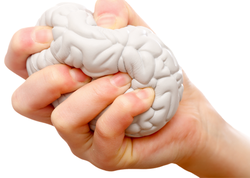What causes dizzinesses? Feeling "dizzy" is something we've all felt at one time or another. This word describes a range of feelings, from a minor headache to feeling unbalances, to feeling a whirring or spinning sensation. Dizziness can be a minor annoyance, the effect of an illness, or a symptom of a serious disease.
Vertigo is the medical term for some forms of dizziness and can be classified as the feeling of the room turning around you, or of things whirling around you or vice versa. This is similar to the kind of feeling you get when you step off a very fast merry-go-round, or after you've been spinning in place for a long time. Serious vertigo might be a symptom of a tumor or can be caused by one many diseases that affect the inner ear, which controls our balance.
A person might feel dizzy for a number of reasons. One reason might be queasiness, such as "at the sight of something disgusting", fainting or almost-fainting, like when a person afraid of blood sees blood, or due to weakness when a person has just suffered from an illness like a cold, flu or fever.
Dizziness can also happen when a person tries to stand up too quickly. The heart needs to pump extra blood to the brain when we move from a sitting to a standing position, and this lack of blood can sometimes cause dizziness. This kind of dizziness is common among women who are pregnant.
Dizziness can also happen because of seasickness or motion sickness, due to confusion, because of tiredness or sleepiness, or because of clumsiness.
Other more serious dizziness reasons include high blood pressure, low blood pressure, heart problems such as arrhythmia, or due to adverse reactions to medications. Dizziness is also linked to age-related problems and metabolic disorders such as dehydration, insulin reactions or low blood sugar levels. In addition, dizziness can also be a symptom of brain tumors.
Of course, dizziness is sometimes linked with emotions, for instance if you have a sudden fright or see someone you are trying to avoid or have strong feelings towards.
There are also some psychiatric causes of dizziness, such as depression, panic disorder, excess anxiety, hyperventilation or somatization.
If your dizziness is very serious, it's a good idea to see a doctor and get a medical checkup. Sometimes dizziness is something very minor (such as the type you get from standing up quickly) but sometimes it has more serious underlying causes.
You might also like
How to Lower Cortisol Levels Reduce Stress Hormone and Improve...Cortisol is a steroid hormone regulating metabolism, the immune system and ai...




 Affect Or Effect? What To Useon 03/22/2012
Affect Or Effect? What To Useon 03/22/2012
 How To Block A Phone Numberon 03/21/2012
How To Block A Phone Numberon 03/21/2012
 What Causes Hiccupson 03/21/2012
What Causes Hiccupson 03/21/2012

Comments